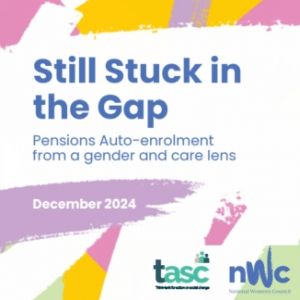National Women's Council: Still stuck in the Gap - Report
Pension auto-enrolment fails to tackle inequality in our pension system for women

While the forthcoming pension auto-enrolment scheme will increase pension coverage, it will not address the structural inequalities faced by women in our pension system and may even make them worse. This is one of the key findings of a new report “Still stuck in the Gap – Pensions Auto-enrolment from a Gender and Care lens” by the National Women’s Council (NWC).
Pension auto-enrolment, due to start in September 2025, is the biggest reform to the Irish pension system since the 1960s, aiming to expand occupational pension coverage. NWC’s new report, which was prepared by Oisín Gilmore, Senior Economist at TASC, examines the scheme and its impact on gender and care inequalities.
The report finds that while the new Pensions Auto-enrolment Scheme is likely to increase occupational pension coverage for those in employment, it is not likely to have an impact in tackling the gender pension gap, currently at around 35% – and may exacerbate it.
The report shows no significant gender difference in terms of occupational pension coverage for those in paid employment, which is comparatively low overall, with 43% of workers having no occupational pension. However, there is a big gender difference in the value of individual occupational pensions, and the new scheme is unlikely to change this.
This is because the focus of the auto-enrolment scheme is on paid employment, leaving out supports for unpaid care and other forms of social participation, and because men tend to contribute more to their occupational pensions.
Women, however, are more likely to take time out off paid employment to take on unpaid care work. Women are also more likely to be in low pay, part time employment and therefore tend to contribute less to occupational pensions.
Women are thereby doubly impacted for the unpaid caring work that they do. Not only do they earn less during working age due to engaging in unpaid care work, but they also receive significantly lower incomes in retirement.
Orla O’Connor, Director of the National Women’s Council said,
“As one of the biggest reforms of our pension system in decades, the new pension auto-enrolment scheme fails to address the deep inequalities in our pension system. The 35% gender pension gap has a significant impact on women’s lives in older age, alongside the legacy of structural discriminations like the Marriage Bar which still affects women. As well as having much lower pension incomes, older women are more likely to live alone than men, and are more likely to live in low-quality housing. By tying pension entitlement even closer to paid employment, auto-enrolment leaves out the importance of unpaid care yet again which impacts women much more than men.”
She continued,
“As auto-enrolment will only apply to people in paid employment with earnings over a certain threshold, all other forms of social participation that are not paid employment will not be taken into account, which is really disappointing to see.”
Donal Swan, Economic Equality Coordinator with NWC said,
“By focusing on private occupational coverage, the Government has missed the opportunity to strengthen and expand the State pension which remains the best way to ensure adequate income for all people, in particular women, in older age.
The new scheme will do nothing to improve the pensions of many low-paid, part time earners and those not in paid employment and will potentially set ourselves on a path towards increasing rather than reducing the already significant gender pension gap.
NWC is calling on the next Government to focus pension reform on improving the structural inequalities in our pension system, by increasing both coverage and level of the State pension with a view to developing a Universal Pension that is adequate for all.”
The report was launched at an event in the Irish Architectural Archive with speakers including Oisín Gilmore, TASC and author of the report, Maureen Moloney, University of Galway, Mary Murphy and Annie Curbelo Lang, Age Action and Senator Alice-Mary Higgins
Read the full report
This Report was funded by the Irish Human Rights and Equality Commission’s Grant Scheme.
